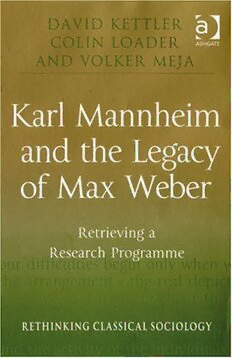Download Karl Mannheim and the Legacy of Max Weber PDF Free - Full Version
Download Karl Mannheim and the Legacy of Max Weber by David Kettler, Colin Loader, Volker Meja in PDF format completely FREE. No registration required, no payment needed. Get instant access to this valuable resource on PDFdrive.to!
About Karl Mannheim and the Legacy of Max Weber
This book focuses on the important work of Karl Mannheim by demonstrating how his theoretical conception of a reflexive sociology took shape as a collaborative empirical research program. The authors show how contemporary work along these lines, whether derived from Foucault, Bourdieu or other theorists, can benefit from the insights of Mannheim and his students into both morphology and genealogy.Inspired by recent receptions of Karl Mannheim that do not restrict themselves to familiar arguments about the sociology of knowledge, the book contains three themes. First it offers a new reading of Mannheim's 'empirical' project, with emphasis on his lifelong dialogue with Max Weber. Special attention is paid to his article on 'economic ambition.' Second, the book analyzes the work arising out of Mannheim's Frankfurt research group, notably the early writings of Norbert Elias, Hans Speier, and Hans Gerth, as well as dissertations by Mannheim's students, including studies of newspapers, women's household roles, sentimentalism in women's literature, relations between female social workers and male bureaucrats, exile, Jewish assimilation, and Liberal 'cultivation.' Finally, the book contributes to the microsociology of knowledge, uncovering the modalities that made for an open working group in Frankfurt that was expressly not a school.The book returns Mannheim's sociology of knowledge inquiries into the broader context of a wider project in historical and cultural sociology, whose promising development was disrupted and then partially obscured by the expulsion of Mannheim's intellectual generation. It is about Karl Mannheim as he served his most productive - and independent - students and not as he has been stereotyped in the literature. As such, it will appeal to sociologists concerned with the contemporary relevance of his work, and who are prepared for a fresh look at Weimar sociology and the legacy of Max Weber.
Detailed Information
| Author: | David Kettler, Colin Loader, Volker Meja |
|---|---|
| Publication Year: | 2008 |
| ISBN: | 9780754689591 |
| Pages: | 229 |
| Language: | English |
| File Size: | 1.288 |
| Format: | |
| Price: | FREE |
Safe & Secure Download - No registration required
Why Choose PDFdrive for Your Free Karl Mannheim and the Legacy of Max Weber Download?
- 100% Free: No hidden fees or subscriptions required for one book every day.
- No Registration: Immediate access is available without creating accounts for one book every day.
- Safe and Secure: Clean downloads without malware or viruses
- Multiple Formats: PDF, MOBI, Mpub,... optimized for all devices
- Educational Resource: Supporting knowledge sharing and learning
Frequently Asked Questions
Is it really free to download Karl Mannheim and the Legacy of Max Weber PDF?
Yes, on https://PDFdrive.to you can download Karl Mannheim and the Legacy of Max Weber by David Kettler, Colin Loader, Volker Meja completely free. We don't require any payment, subscription, or registration to access this PDF file. For 3 books every day.
How can I read Karl Mannheim and the Legacy of Max Weber on my mobile device?
After downloading Karl Mannheim and the Legacy of Max Weber PDF, you can open it with any PDF reader app on your phone or tablet. We recommend using Adobe Acrobat Reader, Apple Books, or Google Play Books for the best reading experience.
Is this the full version of Karl Mannheim and the Legacy of Max Weber?
Yes, this is the complete PDF version of Karl Mannheim and the Legacy of Max Weber by David Kettler, Colin Loader, Volker Meja. You will be able to read the entire content as in the printed version without missing any pages.
Is it legal to download Karl Mannheim and the Legacy of Max Weber PDF for free?
https://PDFdrive.to provides links to free educational resources available online. We do not store any files on our servers. Please be aware of copyright laws in your country before downloading.
The materials shared are intended for research, educational, and personal use in accordance with fair use principles.

